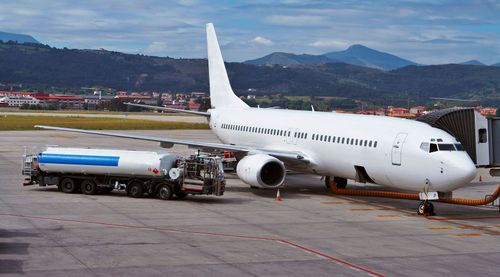Washington bill aims to make SAF available for use in private jets

February 6, 2024
BY Erin Voegele
Legislation currently pending in Washington state aims to require airport operators to make a minimum 10% blend of sustainable aviation fuel (SAF) available to private jets owned by individuals or businesses once certain conditions are met.
The bill, SB 6114, was introduced by Washington Sen. Marko Liias on Jan. 10 and cleared the Senate Transportation Committee on Feb. 5.
According to the bill text, the requirement would kick in within 24 months of the Washington Department of Ecology verifying cumulative SAF production capacity of 20 MMgy. The bill also requires the department to complete a feasibility study for enforcing and carrying out the bill’s requirements by Nov. 1, 2027. Rules for the program would have to be adopted within 12 months of the completion of that feasibility study.
“The detrimental impacts of air pollution are crystal clear in higher rates of asthma and an increased risk of stroke, lung cancer and other serious ailments,” said Liias in a statement released by Washington Senate Democrats. “Requiring sustainable, renewable fuels for private jets is one way to help reverse these risks for future generations while also reducing our carbon footprint.”
Advertisement
Advertisement
“Snohomish County is the global heart of aerospace manufacturing, which has been an important economic driver of the county for over 50 years,” Snohomish County Executive Dave Somers said. “The continued success of aviation – and our economy more broadly – relies on transitioning to cleaner, more sustainable lines of business. Sen. Liias has been a champion for sustainable aviation fuels, and I am grateful for his continued efforts to help decarbonize aviation.”
Additional information SB 6114 is available on the Washington State Legislature website.
Advertisement
Advertisement
Related Stories
The U.S. EPA on July 8 hosted virtual public hearing to gather input on the agency’s recently released proposed rule to set 2026 and 2027 RFS RVOs. Members of the biofuel industry were among those to offer testimony during the event.
The U.S. exported 31,160.5 metric tons of biodiesel and biodiesel blends of B30 and greater in May, according to data released by the USDA Foreign Agricultural Service on July 3. Biodiesel imports were 2,226.2 metric tons for the month.
The USDA’s Risk Management Agency is implementing multiple changes to the Camelina pilot insurance program for the 2026 and succeeding crop years. The changes will expand coverage options and provide greater flexibility for producers.
EcoCeres Inc. has signed a multi-year agreement to supply British Airways with sustainable aviation fuel (SAF). The fuel will be produced from 100% waste-based biomass feedstock, such as used cooking oil (UCO).
President Trump on July 4 signed the “One Big Beautiful Bill Act.” The legislation extends and updates the 45Z credit and revives a tax credit benefiting small biodiesel producers but repeals several other bioenergy-related tax incentives.
Upcoming Events










